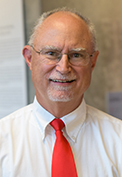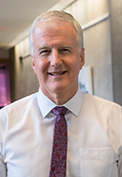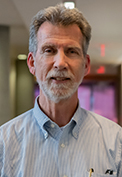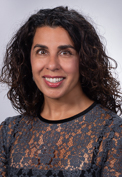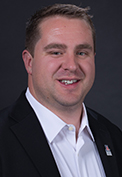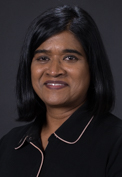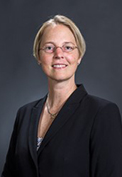
We explore topics that are shaping health care with specialists who are leading innovative change and challenging us to reimagine Medicine.
The University of Arizona College of Medicine – Phoenix is pleased to announce the launch of the reimagine Medicine Podcast.
Each month, we will bring together clinicians, researchers, educators, health care thought leaders and medical students to share the experiences and ideas that are fueling their efforts. Gain insight from doctors who are doing extraordinary things in medicine and researchers who are developing breakthroughs that translate from bench to bedside.
The reimagine Medicine podcast is currently available on iTunes, Stitcher, Google Podcasts, Spotify, iHeartRadio, Vurbl, Amazon Music and TuneIn.
Latest Episode
Meet the Hosts
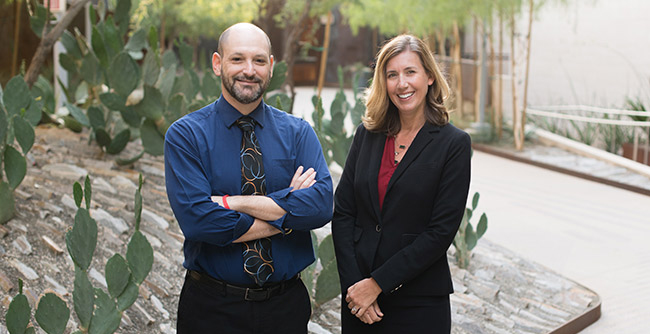
Jonathan Lifshitz, PhD, serves as the director of the Translational Neurotrauma Research Program, which is a joint venture through Barrow Neurological Institute at Phoenix Children’s Hospital, the Department of Child Health at the University of Arizona College of Medicine – Phoenix and the Phoenix Veterans Affairs Health Care System.
Katie Brite, MD, is the chair of the Curriculum Committee and co-director of the Family Community and Preventive Medicine Clerkship at the University of Arizona
College of 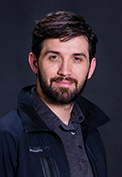 Medicine – Phoenix, placing students with community clinical partners across the state. She is a family physician and the vice president of Primary Care Services at Bayless Integrated Healthcare.
Medicine – Phoenix, placing students with community clinical partners across the state. She is a family physician and the vice president of Primary Care Services at Bayless Integrated Healthcare.
*The reimagine Medicine Podcast is narrated by C. Luke Peterson, DO. Dr. Peterson is a clinical assistant professor in the Department of Family, Community and Preventive Medicine and the associate program director of the Addiction Medicine Fellowship.
Episodes
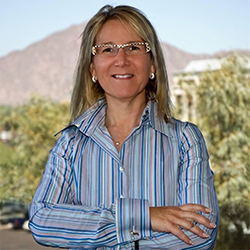
Head injuries are more common in the spring and summer months, when children are active in outdoor activities and playing sports. Parents and children alike are excited about the return of youth sports after a hiatus due to the pandemic.
Lois Sayrs, PhD, specializes in child health and injury. Dr. Sayrs will help answer the question, “If your child experiences a head injury, how do you know when it is time to see the doctor?”
Guest
Lois Sayrs, PhD, is a senior research scientist in child health and injury, specializing in trauma and surgical studies.
She serves as a research assistant professor with the University of Arizona College of Medicine – Phoenix and program director with Arizona State University’s Center for Applied Behavioral Health Policy.
Physicians are trained to deal with medical emergencies, but COVID-19 thrust hospitals in Phoenix — and around the world — into crisis mode for nearly a year. Phoenix was a COVID hotspot, as were other cities like New York. There have been 30 million cases and more than 540,000 deaths in the US, nearly 17,000 of whom were Arizonans.
This was a tremendous test of crisis leadership as medical teams worked to understand the disease, identify treatment protocols and share valuable information. Marilyn Glassberg, MD, shares insights from her experience leading frontline teams and how a tweet led to a new predictive model for COVID lungs.
Guest
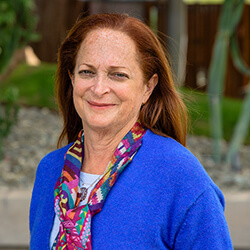 Dr. Glassberg is the inaugural division chief of Pulmonary Medicine, Critical Care and Sleep Medicine; the vice-chair for Diversity and Inclusion; as well as senior director of Clinical Research for Strategy and Growth for the Department of Internal Medicine at the University of Arizona College of Medicine – Phoenix and Banner – University Medical Center Phoenix.
Dr. Glassberg is the inaugural division chief of Pulmonary Medicine, Critical Care and Sleep Medicine; the vice-chair for Diversity and Inclusion; as well as senior director of Clinical Research for Strategy and Growth for the Department of Internal Medicine at the University of Arizona College of Medicine – Phoenix and Banner – University Medical Center Phoenix.
February is American Heart Month, and this year the theme is, Heart Disease: It Can Happen at Any Age. Heart disease doesn’t happen just to older adults. It is happening to younger people more often, partly because the conditions that lead to heart disease are happening at younger ages. It is important to learn about your risk of heart disease and the steps necessary to have a healthy heart.
Wayne Franklin, MD, shares advancements that are improving outcomes for pediatric cardiac patients.
Guest
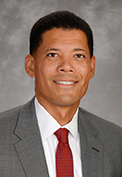 Dr. Franklin is a graduate of Williams College in Williamstown, Massachusetts, and UCLA School of Medicine. He did his residency training in internal medicine and pediatrics at Duke University, where he first was exposed to Adult Congenital Heart Disease (ACHD). He then did two simultaneous fellowships in adult cardiology and pediatric cardiology at St. Luke’s/Texas Heart Institute and at Baylor College of Medicine (BCM)/Texas Children’s Hospital (TCH) in Houston.
Dr. Franklin is a graduate of Williams College in Williamstown, Massachusetts, and UCLA School of Medicine. He did his residency training in internal medicine and pediatrics at Duke University, where he first was exposed to Adult Congenital Heart Disease (ACHD). He then did two simultaneous fellowships in adult cardiology and pediatric cardiology at St. Luke’s/Texas Heart Institute and at Baylor College of Medicine (BCM)/Texas Children’s Hospital (TCH) in Houston.
After a lengthy career — that included founding the Texas Adult Congenital Heart Program in 2004, as well as being appointed chief of Cardiology at the TCH Pavilion For Women in 2013, amongst other notable achievements — Dr. Franklin came to Phoenix in 2018 to join Phoenix Children’s Hospital as the co-director of the Heart Center; the director of the ACHD Program; and the chair of the Department of Adult Medicine.
In addition, he is a full professor in three University of Arizona College of Medicine – Phoenix Departments — including the Medicine, Child Health and Obstetrics and Gynecology.
What drives people to pursue careers in medicine? Physicians are definitely Type A personalities who want to be the ones in charge, finding solutions to complex issues. But they are motivated by a commitment to serve.
Guest
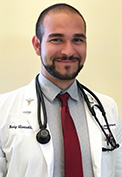 Haig Aintablian, MD, is committed to serving patients in urgent need, whether they present at the emergency department or an under-resourced hospital in Armenia. Dr. Aintablian is a PGY3 resident in Emergency Medicine at UCLA and a graduate of the University of Arizona College of Medicine – Phoenix. He recently traveled to Armenia — amid a pandemic and a war — to donate $100K in medical supplies, ultrasound supplies and medical training.
Haig Aintablian, MD, is committed to serving patients in urgent need, whether they present at the emergency department or an under-resourced hospital in Armenia. Dr. Aintablian is a PGY3 resident in Emergency Medicine at UCLA and a graduate of the University of Arizona College of Medicine – Phoenix. He recently traveled to Armenia — amid a pandemic and a war — to donate $100K in medical supplies, ultrasound supplies and medical training.
For older adults, a hospital stay can create challenges beyond the medical condition that caused them to be hospitalized. As "Baby Boomers" age, it is estimated that twenty percent of the U.S. population will be retirement age by 2030.
Building age friendly health care systems is crucial to serving the health care needs of older adults. Nimit Agarwal, MD, developed the Mind, Mobility, Medication program to look at components of care during hospitalization and build independence for patients post-hospitalization.
Guest
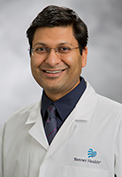 Dr. Nimit Agarwal is a geriatrics and internal medicine physician leading the Division of Geriatric Medicine at Banner – University Medical Center Phoenix and the University of Arizona College of Medicine – Phoenix. He leads the Center for Healthy Aging at Banner – UMC Phoenix and is the associate program director of the Geriatric Medicine Fellowship Program.
Dr. Nimit Agarwal is a geriatrics and internal medicine physician leading the Division of Geriatric Medicine at Banner – University Medical Center Phoenix and the University of Arizona College of Medicine – Phoenix. He leads the Center for Healthy Aging at Banner – UMC Phoenix and is the associate program director of the Geriatric Medicine Fellowship Program.
Algorithms are moving out of the lab and into society, where they are asked to answer tough questions: Which inmates to release? Which job applicants to hire? Which patients to treat? These types of questions cause algorithms to stumble — not so much because they are hard to answer, but because they are hard to ask.
Guest
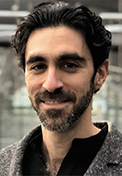 Ziad Obermeyer, MD, is an associate professor of Health Policy and Management at the UC Berkeley School of Public Health, where he does research at the intersection of machine learning, medicine and health policy. He previously was an Assistant Professor at Harvard Medical School.
Ziad Obermeyer, MD, is an associate professor of Health Policy and Management at the UC Berkeley School of Public Health, where he does research at the intersection of machine learning, medicine and health policy. He previously was an Assistant Professor at Harvard Medical School.
An emergency physician by training, he researches the intersection of algorithms and emergency medicine. By focusing on how machine learning can improve diagnoses, Dr. Obermeyer seeks to help doctors make more accurate predictions about patients’ conditions and quickly identify optimal treatment.
Students are going back to school in virtual and in-person learning modalities adapted for a pandemic. We will discuss the risk/reward of sending children to school while keeping them healthy.
Guest
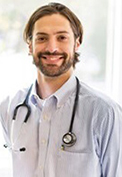 Gary E. Kirkilas, DO, is a pediatrician at Phoenix Children’s Hospital, an assistant professor at the College of Medicine – Phoenix and a father of three. He also operates the Mobile Health Unit, a 40-foot medical R.V. that travels from shelter to shelter providing free health care to homeless and disadvantaged youth in Phoenix-area communities.
Gary E. Kirkilas, DO, is a pediatrician at Phoenix Children’s Hospital, an assistant professor at the College of Medicine – Phoenix and a father of three. He also operates the Mobile Health Unit, a 40-foot medical R.V. that travels from shelter to shelter providing free health care to homeless and disadvantaged youth in Phoenix-area communities.
Precision medicine takes a big-data approach to disease prediction, prevention, detection and treatment designed to benefit both individual health and public health.
The promise of precision medicine is to enhance our knowledge of disease and identify treatment, as well as medication that is best-suited to the patient.
Advancements in technology are rapidly expanding the possibilities. In this episode, we are exploring the role that big data, machine learning and AI play in precision medicine.
Guests
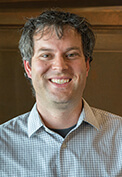 Will Heise, MD, is the research director for the Division of Clinical Data Analytics and Decision Support. He also serves as an assistant professor in the Division of Medical Toxicology and Precision Medicine at the University of Arizona College of Medicine – Phoenix.
Will Heise, MD, is the research director for the Division of Clinical Data Analytics and Decision Support. He also serves as an assistant professor in the Division of Medical Toxicology and Precision Medicine at the University of Arizona College of Medicine – Phoenix.
Dr. Heise is a medical toxicologist and family physician. His teaching and research interests include critical care toxicology, precision medicine and clinical decision support.
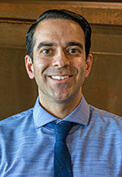 Hamed Abbaszadegan, MD, MBA, FACP, is an informaticist and internist with the Phoenix Veterans Affairs Health Care System.
Hamed Abbaszadegan, MD, MBA, FACP, is an informaticist and internist with the Phoenix Veterans Affairs Health Care System.
He also serves as a clinical associate professor in Biomedical Informatics, as well as residency program director of Clinical Informatics at the University of Arizona College of Medicine – Phoenix.
Each of us inherit genetic material that forms who we are and that guides our way through life. Experiences throughout life can modify the genome and the genetic transcripts that constitute us.
In one way, genetics are a determinant of health. However, social determinants of health can overshadow, highlight or coincide with genetics to increase vulnerability or resilience to disease.
We have brought together interdisciplinary thought leaders to discuss the contribution of inherited genes to health and disease. We will explore the capabilities, future trends and challenges of genetic knowledge, counseling and interventions.
Guests
|
Anastasia Wise, PhD, is program director in the Division of Genomic Medicine at the National Institutes of Health’s National Human Genome Research Institute. |
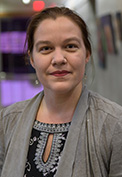 |
|
Michael Kruer, MD, is an associate professor of Neurology and Child Health with the University of Arizona College of Medicine – Phoenix. He also serves as director, Cerebral Palsy and Pediatric Movement Disorders Program, Barrow Neurological Institute, Phoenix Children’s Hospital. |
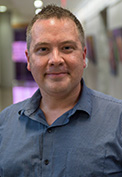 |
|
Matt Huentelman, PhD, is a professor in the Neurogenomics Division of the Translational Genomics Research Institute (TGen). His research interests center around the investigation of the “-omics” (genomics, transcriptomics, and proteomics) of neurological traits and disease. |
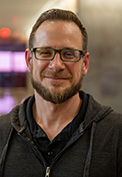 |
|
Dee Quinn, MS, CGC, is program director of the University of Arizona Genetic Counseling Graduate Program. She also serves as director of MotherToBaby Arizona. She is a clinical instructor with the University of Arizona College of Medicine – Tucson Department of Obstetrics and Gynecology and the College of Pharmacy. |
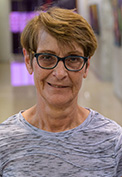 |
In 2017, Arizona Governor Doug Ducey declared a public health state of emergency as more than two Arizonans were dying each day from opioid overdoses. The Arizona Opioid Epidemic Act was introduced in response to the opioid epidemic. It is the most comprehensive package any state has passed to address this issue and crisis to date.
As a result, undergraduate and graduate health education and practitioner programs in Arizona have developed a first-of-its-kind statewide curriculum that calls on all provider types to address the public health emergency.
We are talking with leaders who are at the forefront of helping solve America’s biggest public health issue.
Guests
|
Cinda Stone, MEd, serves as director of curricular management with the University of Arizona College of Medicine – Phoenix. Ms. Stone represented the college on a consortium of 18 health care institutions, which identified 10 initiatives and 73 proposed objectives, in response to the Arizona Opioid Epidemic Act. She led the college’s audit of its curriculum to meet all 73 of the state’s proposed objectives and conducts ongoing annual reviews to ensure students receive the most current information in their medical education. |
|
|
Maria Manriquez, MD, FACOG, is a professor in the Department of Obstetrics and Gynecology at the University of Arizona College of Medicine – Phoenix. Her research focuses on addiction medicine, specifically substance abuse disorder in pregnant and parenting women. Dr. Manriquez directs the Beyond Addiction Program, which serves pregnant and parenting women in rural and urban areas who have substance abuse disorder. She also serves as director of the Pathway Scholars Program. |
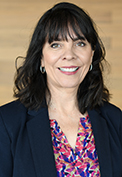 |
|
Luke Peterson, DO, is a physician specializing in family medicine and addiction medicine at Banner – University Medical Center Phoenix. He also serves as assistant director of the Addiction Medicine Fellowship Program, which he created with Anita Karnik, MD, who is an addiction psychiatrist at the Phoenix VA. The Addiction Medicine Fellowship Program, sponsored by the Arizona Health Care Cost Containment System (AHCCCS), operates under the U of A College of Medicine – Phoenix and is accredited by the Accreditation Council for Graduate Medical Education (ACGME). The college is one of nearly 50 fellowships that were granted accreditation. The one-year fellowship includes clinical rotations at Banner – University Medical Center Phoenix and the Phoenix VA Health Care System. |
 |
A recent report published by the Association of American Medical Colleges confirms the United States will experience a shortage of over 121,000 physicians by 2032. Our nation’s population is growing older and living longer. The demand for physicians continues to grow faster than medical schools and residencies can prepare new doctors.
Guests
|
Jeffrey Wolfrey, MD, leads the Department of Family, Community and Preventive Medicine at the University of Arizona College of Medicine – Phoenix. He also serves as chairman of the Banner – University Medical Center Phoenix Department of Family Medicine and is a board-certified family medicine physician. |
|
|
Glen Fogerty, PhD, MBA,is the associate dean of Admissions and Recruitment at the University of Arizona College of Medicine – Phoenix. He also serves as assistant professor in the Department of Bioethics and Medical Humanism. Dr. Fogerty is the co-block director of the Introduction to Medicine course — in addition to directing the MD/MBA dual-degree program. |
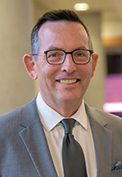 |
|
Cheryl O’Malley, MD, FACP, FHM, serves as associate dean of Graduate Medical Education. She is also a clinical associate professor in the Department of Internal Medicine. Dr. O’Malley has been program director for the Internal Medicine Residency Program since 2008, a program that has been repeatedly recognized as one of the most innovative in the country. |
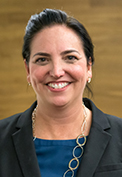 |
Rural communities in Arizona (and across the U.S.) continue to experience a chronic shortage of physicians and health care professionals, as well as limited access to medical facilities. Economic factors, cultural and social differences, limited facilities and geographic isolation are among the many obstacles that contribute to health care disparities and impede efforts to lead healthy lives. We will talk with physicians who are working with communities to improve rural health.
Guests
|
William Cance, MD, leads the University of Arizona Cancer Center in Phoenix, and is a renowned oncology surgeon and physician-scientist. He also serves as interim director of the UA Cancer Center in Tucson. Dr. Cance has made enormous strides across the state of Arizona to establish a culture of collaboration to advance cancer care and treatment. |
|
|
Damon Dixon, MD, is a pediatric cardiologist practicing in the greater Phoenix area. He is affiliated with Phoenix Children’s Hospital and Mayo Clinic Hospital. Dr. Dixon is also an advocate for the development and implementation of community-based programs that address health care disparities. |
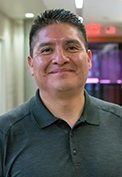 |
|
Jonathan Cartsonis, MD, is a practicing family physician, as well as director of the Rural Health Professions Program and co-director of the Pathways Clinical Practicum course at the University of Arizona College of Medicine – Phoenix. He also serves as the medical director for the Collaborative Ventures Network and is a staff physician with Maricopa County Correctional Health. |
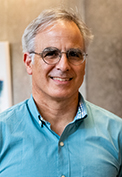 |
|
Kathryn (Katy) Blevins Katy is a member of the UA College of Medicine – Phoenix’s Class of 2023. |
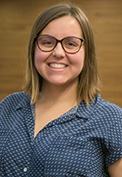 |
Behavioral and developmental issues are tremendous stressors for children and families. Students who have struggled in school will likely be under additional stress in the next school year. Families want to know what they can do to prepare for the next academic year. We will explore best practices in diagnosis and treatment through a well-rounded discussion, leveraging our partnership with Phoenix Children’s Hospital.
Guests
|
John Barton, MD, is a pediatric psychologist at Phoenix Children’s Hospital. He serves as a senior lecturer in the Department of Psychology at Arizona State University, as well as director of the Clinical Psychology Center at ASU. Dr. Barton specializes in working with children with learning and attention issues. He also has expertise in the areas of parenting difficult children and adjusting to chronic illness. |
|
|
Vinny Chulani, MD, is section chief of Adolescent Medicine at Phoenix Children's Hospital. He is one of only a handful of specialists in Arizona. Dr. Chulani also specializes in working with gay, lesbian, bisexual and transgender (GLBT) youth, including those seeking gender affirmation therapies. |
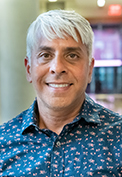 |
|
Randall Ricardi, DO, is the program director of the Child and Adolescent Psychiatry Fellowship Program at Phoenix Children’s Hospital. He is a neurologist, as well as a child and adolescent psychiatry specialist. |
 |
|
Funda Bachini, MD, is the associate program director of the Child & Adolescent Psychiatry Fellowship Program at Phoenix Children’s Hospital. She is also medical director of the Inpatient Psychiatry Unit at Phoenix Children’s Hospital. Dr. Bachini specializes in child and adolescent psychiatry. |
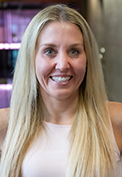 |
Resources
- Arizona Legislature.
- Arizona American Speech-Language-Hearing Association (ASHA).
- Arizona Department of Education Office of Exceptional Students.
- Arizona Early Intervention Program (AZEIP).
- Arizona Psychological Association.
- Autism Society of Greater Phoenix.
- Community Information and Referral.
- Effective Child Therapy.
- Healthy Children – American Academy of Pediatrics (AAP).
- LD Association of America.
- LD Online.
- Phoenix Children's Hospital Family Center.
- Special Education Law.
- Books:
- Grit by Angela Ducksworth (2016).
- Mindset: The New Psychology of Success by Carol Dweck (2006).
- Building Resilience by Kenneth Ginsburg (2015).
Heart disease is the #1 killer of both women and men in the United States. The latest statistics indicate 1-in-2 Americans will develop some form of cardiovascular disease. What is being done to change this trend? We have brought together leading experts who are taking on heart disease.
Guests
|
Martha Gulati, MD, MS, is the division chief of Cardiology for the University of Arizona College of Medicine – Phoenix and Physician Executive Director for the Banner – University Medicine Heart Institute. Dr. Gulati leads education activities in cardiovascular sciences for medical students, residents and fellows at the college and Banner Health; she also leads clinical heart care as the director of the Cardiovascular Institute at Banner. Dr. Gulati is a passionate advocate for women’s heart health. |
|
|
Dean Guy Reed, MD, MS, is a noted cardiologist, physician-scientist and health administrator. He is also the dean of the UA College of Medicine – Phoenix. Dean Reed is internationally known for his research on the mechanism of blood clots and vascular disease. His research findings have been translated into an innovative, clot-dissolving therapy to treat patients with strokes and heart attacks. The therapy is now in clinical trials. |
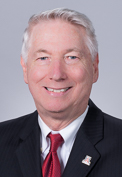 |
|
Taben Hale, PhD, is a specialist in cardiovascular pharmacology and associate professor in the Basic Medical Sciences Department at the University of Arizona College of Medicine – Phoenix. She leads a nationally recognized research program investigating the consequences of high blood pressure on the structure and function of the heart. The goal of her work is to develop new drug treatments to prevent progression to heart failure. Dr. Hale mentors trainees at all levels, from high school students to post-doctoral fellows. She serves as director of the Department of Basic Medical Sciences’ High School Internship Program and teaches pharmacology to first- and second-year medical students. |
 |
What are the barriers for those with disabilities to access health care? We focus on the intersection of disability and medicine to identify how to teach, deliver and advance health care for patients with access challenges. We have brought together experts who are championing exciting initiatives to overcome these challenges. By engaging physicians, patients, caregivers, policymakers and communities, they are empowering “abilities.”
Guests
|
Oluwaferanmi Okanlami, MD, MS, is an assistant professor in the Departments of Family Medicine and Physical Medicine and Rehabilitation, as well as director of Medical Student Programs in the Office for Health Equity and Inclusion at the University of Michigan. |
|
|
Darrel Christenson is vice president of community integration with Ability360. Mr. Christenson oversees Independent Living skills training, home modifications, information and referrals and Independent Living services to individuals with disabilities. All services aim to empower persons with disabilities to take responsibility for their lives and live independently in their community. |
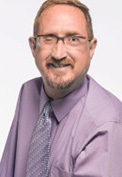 |
|
Cara Christ, MD, MS, serves as director for the Arizona Department of Health Services. Dr. Christ is a University of Arizona College of Medicine graduate. She has collaborated with health partners and stakeholders to develop strategic plans for advancing health care, including infectious disease prevention and control. |
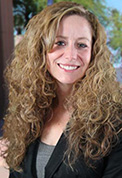 |
What if:
- Your insulin pump suddenly overdosed?
- A patient’s bedside medication pump malfunctioned?
- A children’s hospital lost internet access from a cyber attack?
These aren't just examples; they've actually happened.
Medical devices and hospitals have been the targets of cyber attacks from hackers. The CyberMed Summit brings together the leading minds in cyber security to develop solutions to keep patients safe and medical technology secure.
Guests
|
Dr. Christian Dameff is a founder of the CyberMed Summit, an emergency medicine physician and a researcher. A University of Arizona College of Medicine – Phoenix Class of 2014 graduate, Dr. Dameff is board-certified in Emergency Medicine and is currently a Clinical Informatics fellow at the University of California, San Diego. |
|
|
Dr. Jeff Tully is also a founder of the CyberMed Summit, a pediatric physician and a security researcher. Dr. Tully is a graduate from the University of Arizona College of Medicine – Phoenix Class of 2014. He is board-certified in Pediatrics and is currently an Anesthesiology resident at the University of California, Davis Medical Center. |
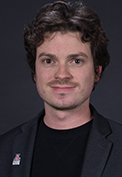 |
|
Dr. Suzanne Schwartz serves as the associate director for science and strategic partnerships with the Center for Devices and Radiologic Health at the US Food and Drug Administration. |
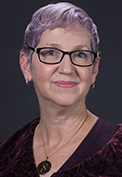 |
|
Patrick O’Connor is a third-year medical student with the UA College of Medicine – Phoenix. He has attended both CyberMed Summits and is currently working on a project with Dr. Christian Dameff and Dr. Jeff Tully. |
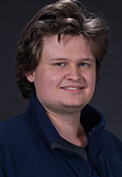 |
The holiday season is not a time of joy and celebration for everyone. For many, preparing for the holidays brings elevated levels of stress, anxiety, loneliness and depression. This discussion centers on the philosophy that we teach our students, “If you do not first take care of yourself, then you will not be able to care for others.” This philosophy is applicable to anyone with responsibilities of caring for or guiding others, be they parents, physicians, patients, caregivers or leaders.
- Counseling resources (PDF).
- Transcript of the episode (PDF).
Guests
|
Lizy Windsor is a clinical simulation nurse in the UA College of Medicine – Phoenix's Center for Simulation and Innovation. Lizy has 26 years experience working as a nurse in a clinical setting. She has a master's in Nursing Education and recently started her doctor of nursing practice program in Mental Health. She is also an active reservist in the US Air Force Reserve. |
|
| Kristen Ray, DBH, LPC, is a licensed professional counselor and doctor of behavioral health. She serves as the vice president of Behavioral Health at Bayless Integrated Healthcare. Dr. Ray has extensive experience in integrated health care delivery, individual/family therapy, crisis intervention, program development and evaluation. | 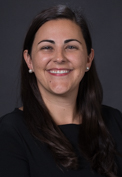 |
| Gina Touch-Mercer, PhD, is a clinical psychologist and an assistant professor in the Departments of Psychiatry and Family, Community and Preventive Medicine. She also serves as the director of the Behavioral Health and Social Sciences Theme, which is spread across the four-year MD curriculum to help students understand and heal the whole person. |  |
Through evidence-based medicine approaches and process improvement, our partners at the Phoenix Veterans Affairs Health Care System are striving to improve the timeliness of health care delivery, early diagnosis and intervention, as well as disease prevention and healthy lifestyles. Learn more about the challenges they are experiencing — and the advancements they have made.
- Transcript of the episode (PDF).
Guests
|
Michelle Dorsey, MD, is the chief of radiology and clinical assistant professor in the Department of Radiology at the Phoenix Veterans Affairs Health Care System. Dr. Dorsey was selected as the first physician to represent the Department of Veterans Affairs as a White House Fellow with the White House Leadership Development Program. |
|
| Clement Singarajah, MD, is an internist and leads the ICU division at the Phoenix Veterans Affairs Health Care System. He is a prominent leader in medical and resident education and has been positively impacting the training of future physicians in Arizona throughout his career. | 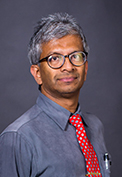 |
| Colan Kennelly, MD, is a primary care physician at the Phoenix Veterans Affairs Health Care System. A graduate of the University of Arizona College of Medicine – Tucson, Dr. Kennelly helps prepare future physicians through his roles as lecturer and scholarly project mentor with the UA College of Medicine - Phoenix. | 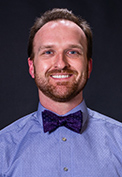 |
| Haroon (Aaron) Kisana is an MD candidate in the Class of 2021 at the University of Arizona College of Medicine – Phoenix. Mr. Kisana volunteered with the VA from the age of fourteen until he entered medical school. His scholarly project is titled, “Using Virtual Transition Telehealth to Reduce Readmission in High-risk Patients at the Phoenix VA.” | 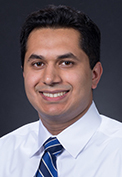 |
